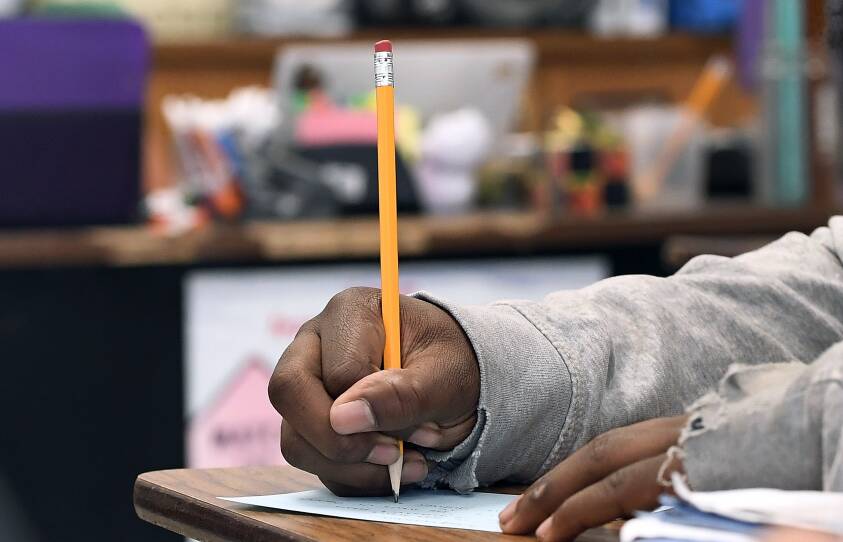Alison Mann left her job as a Boston Public Schools kindergarten teacher last year, but she said her departure had nothing to do with the students. As a Black teacher, she always felt pressure to help students and teachers reckon with systemic racism — a need that felt more acute in the last year and a half. Mann says it became a heavy load.
“I felt like sometimes it was a little, ‘That’s Alison’s job,’ or ‘That’s Alison’s work.’ Not our work as a school,” Mann said. “And it’s big. And, you know, it become overwhelming and a lot to be the only holder of that work.”
In a profession that’s talked about the importance of diversifying its workforce for decades, these are particularly challenging times for teachers of color. There are no hard numbers on how many of the nation's teachers of color have left the profession during the pandemic, but anecdotally, many expressed feeling overburdened by the slow pace of systemic change and a lack of support.
While it’s been proven again and again that student educational outcomes improve when students see teachers who look like them, and programs and grants abound to address the shortage, solutions have only nipped around the edges. Forty percent of students in Massachusetts are non-white, but just 14% of teachers are, according to the Wheelock Educational Policy Center at Boston University. Latinos are one of the fastest growing students populations in the state, but just 3% of the teachers in Massachusetts are Latino, well below the national average of 9%, according to Latinos for Education.
More Education
Latinos for Education CEO Amanda Fernandez, who also sits on the state board of education, said recruiting and retaining teachers of color was already a problem before the pandemic. She's working with a statewide coalition on a legislative proposal to make teacher certification easier for teachers of color and require Massachusetts school districts to report their staff diversity data and hiring goals.
“We are in it to make change, because this is really about outcomes for kids,” she said. “This is certainly about the educators thriving and feeling successful and feeling valued. But what that leads to is better outcomes for for kids of color.”
Katie Caster, a Latina elementary school teacher in Boston, also left the job last year. She says Black teachers often talk about a “Black tax” or the “invisible tax.”
“I think for being Latinx, Latina, there's a sense of a ‘brown tax,’” Caster said. “The ‘brown tax’ is the extra responsibilities or the extra expectations that are often put on teachers of color.”
It’s the toll taken every time a brown or Black teacher is asked to discipline a student of color on the assumption that they are better able to communicate with that student. Or the expectation that they will prepare students for the racism they experience outside of school or make a school more culturally competent.

Caster, like Mann, was a teaching veteran. She's taught English language learners, science and math, and special education, getting licensed in those specialties and others.
“At least for me, personally, I always feel like I have to be overqualified. Right?” Caster said. “I always have to have all those things on the resume, in order to get my foot in the door.”
Aware of her influence on students of color, she organized activities at her school, like a group specifically for girls of color to connect and bond. She says she passionately wanted to go the extra mile for her students. After all, that's why she became a teacher.
So it stung when her medical request to teach from home during the pandemic because she is immunocompromised was denied.
When she saw some teachers win approval to teach remotely, Caster called it quits after 14 years in the classroom.
“I had also done so much for them, whether it was curricula, helping with curriculum, leading groups at my school, doing all these things,” she said. “And that was just, it was almost like a slap in the face.”
She’s moved on, and is studying for her PhD at Columbia University’s Teachers College.
Black Educators’ Alliance of Massachusetts President Kim Parker says she's seeing Black teachers leave or retire because of the intensity of the last year and a half, but it doesn’t have to be that way.
“It breaks my heart that they're like, ‘No, I'm just, I'm tired,’ or ‘I wanted to do other things,’ or they didn't feel like they were making the amount of change that they wanted to,” she said.
Parker said she has been thinking about the need for comprehensive professional development for Black teachers, something her organization is doing, she said, but is missing in most districts. There are also schools that aren’t welcoming at all to Black educators, that have punitive evaluation systems or few Black teachers.
Parker compared that to her work as a teacher in suburban Newton. Teachers met to reflect on what they were reading and to explore new techniques they were thinking about applying. She said it lifted them, as “scholars of the practice.”
Without that, she said, the job can feel like a day-to-day gig.
Mann, the former kindergarten teacher, says she's still sorting through the events of the last year and a half. When she recognized her burnout, she took care of herself, reaching out to friends for support and nurturing plants, lots of plants.
And she realized it was time to move on.
“We are hurting,” she said. “You know, we need the support that you're asking us to give.”
After her 12 years in classrooms, Mann is still in education, working as an administrator in another local school district.








